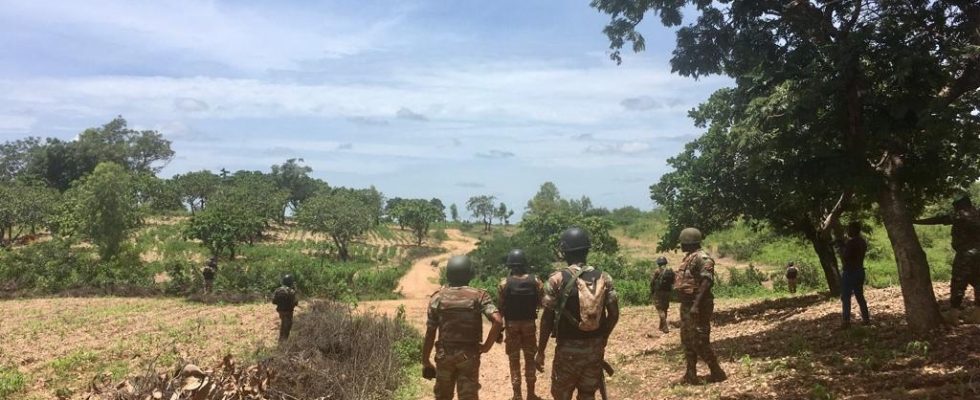Since 2019, Benin has faced terrorist attacks in the north of its territory. To defend themselves against these jihadist groups trying to expand from the Sahel to the Gulf of Guinea, the Beninese authorities have put in place a military response, with Operation “Mirador”, but not only that.
4 mins
Since 2019, the north of Benign has repeatedly been the scene of terrorist attacks. These groups, present in the Sahel countries, are trying to expand towards the Gulf of Guinea. To defend itself against this threat, Benin has put in place a strategy, particularly military.
At the beginning of 2022, following the attack on a military post located on the border with Burkina Faso, the Beninese army launched Operation Mirador, in order to fight against terrorism and secure its borders.
Crossing the north of the country
With around 3,000 men, Operation Mirador is deployed in the northern departments. Rural areas, in which there are also the two large national parks of Pendjari and W, currently closed to tourists due to this insecurity.
Special recruitment of 5,000 people also began this year to strengthen the workforce.
The soldiers of Operation Mirador are crisscrossing this territory, with the aim of trying to prevent incursions by armed groups and their possible descent further south.
The most exposed areas are currently those bordering Burkina Faso, to the west. Lieutenant-Colonel Assouma Abdouraoufou, commander of the combined arms battle group for the western zone of Operation Mirador, says the military response has evolved significantly.
Read alsoGuest Africa – Fight against terrorism: “For the moment, we have not noted the presence of any permanent cell in Benin”
“ A lot of things have been put in placehe says. The first is the projection of our forces onto places that were not yet occupied by the army. The second is that we have equipment. We were surprised by the threat in 2019 but today, gradually, we have had to acquire equipment that helps us project forces and ensure logistics on the different positions “.
New equipment includes drones, armored vehicles or helicopters. The army is also counting on strengthening partnerships with neighboring countries. Niger, a country where a coup d’état took place on July 26, 2023, has however just denounced the agreement concluded a little over a year ago with Benin.
Three jihadist groups behind the attacks, according to the Beninese army
The Beninese army mentions three groups behind attacks on Beninese soil: the JNIM (the support group for Islam and Muslims), Ansaru and the Islamic State in the Greater Sahara (EIGS).
The general staff affirms that there is, to its knowledge, no cell permanently established on the national territory, and that Benin is, for these groups, a transit zone between the Sahel and Nigeria. , for traffic and resupply.
What are these groups seeking by attacking Benin? For Colonel Faïzou Gomina, commander of Mirador, they want “ cause population displacements. And when these populations empty the places, it will be a problem of managing the displaced, and this will allow them to settle in the empty spaces. I believe that this is what they are looking for, because there is no ideological claim, no territorial claim, no claim that we know of. “.
The terrorists’ modus operandi has evolved over time. Their attacks first targeted defense and security forces, then civilians, as when around fifteen people were killed in the commune of Kérou last May.
The general staff gives an overall toll of 43 civilians and 25 Beninese soldiers killed, as well as 63 attackers neutralized, in terrorist acts.
Do not bet everything on the military response
As in other countries facing the terrorist threat, many actors are also asking not to bet everything on the military response. Benin, which relies heavily on the cooperation of populations in the North, has implemented civil-military actions, which may consist, for example, of digging a well or providing access to medical consultations. There is also work to raise awareness among the population.
“ A certain number of partners think that insecurity or radicalization are a response to a social situation of exclusion and that we must work for inclusionexplains Emmanuel Sambieni, anthropologist at the University of Parakou and deputy director of Lasdel in Benin. Thus, over time, there will be fewer candidates for recruitment to feed the centers of attack. There was also training, given by NGOs in the communities, to explain how to react when we are in a situation of insecurity linked to this phenomenon. “.
In an article published a few weeks ago, the Institute for Security Studies (ISS) highlighted the importance of population cooperation against violent extremism. But this depends, according to the ISS, on the capacity of the State to guarantee the security of these civilians.
